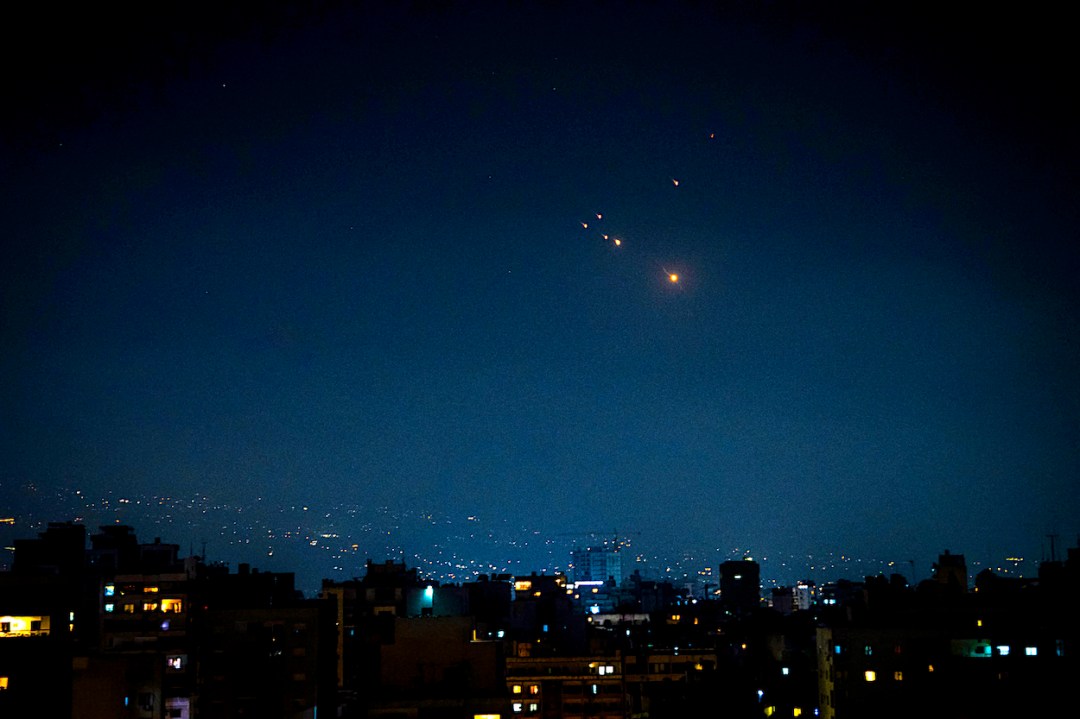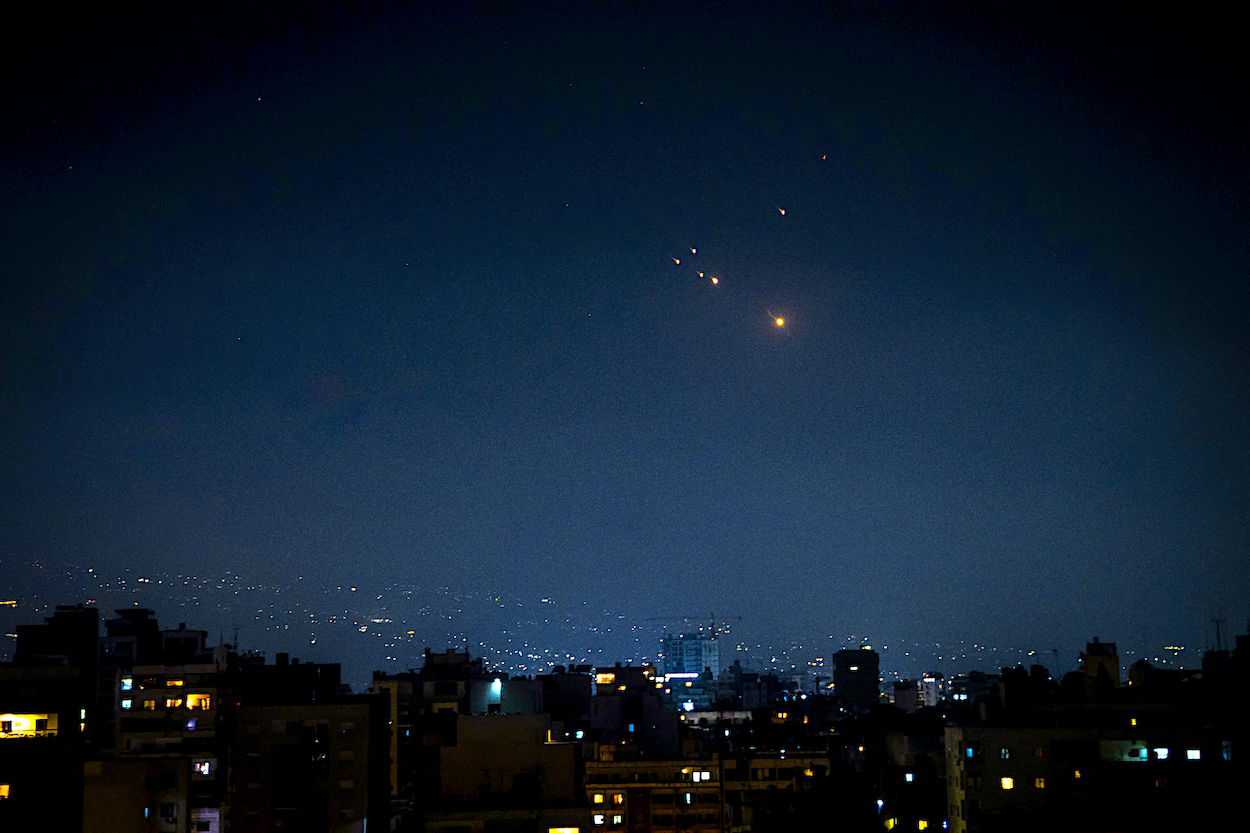Tel Aviv, Israel
Israelis last night once again found themselves seeking shelter as the Islamic Revolutionary forces in Iran launched their long-anticipated retaliation for Israel’s 15-hour offensive against their nuclear and ballistic missile facilities. The Israeli strikes themselves had come as something of a surprise, not entirely unforeseen, but unexpected in their timing. Perhaps as part of an elaborate decoy, or perhaps as an unfortunate casualty of circumstance, the annual Tel Aviv Pride parade – whose stages, tents and other facilities had been installed and tested throughout Thursday – was dismantled on Friday before the event could take place. Caitlyn Jenner, perhaps the world’s most famous ‘trans’ activist, had flown in specially for the occasion. Instead of celebrating sexual liberation and equal rights, the city found itself under threat, leaving Jenner to give interviews about Israeli resilience and solidarity, rather than about joyful festivities.
Thus it was that we rose abruptly from our Friday dinner table and calmly descended to the bomb shelter in the basement. Eight people and two cats huddled together, relying on patchy wifi to glean updates through thick concrete walls, while I attempted to conduct a live radio report, battling intermittent connection.
In Israel, adherence to the Home Front Command’s instructions is second nature. The directive is clear: remain close to shelter and stay inside when the siren sounds until the all-clear is given. For the past 20 months, this routine has typically meant a ten-minute wait, while the Iron Dome and other systems neutralised incoming threats. This time it was different. Around 100 missiles were launched from various Iranian positions, including, it is believed, from a submarine. The scale and complexity of this attack rendered interception markedly more difficult. The United States provided vital assistance, and notably, Saudi Arabia allowed Israeli forces to intercept Iranian drones over its airspace – a striking development that signals how close Saudi-Israeli normalisation may now be.
More troubling still, Iranian forces deliberately targeted civilian centres, including Tel Aviv, and timed the assault for Friday night, when many families were gathered for Shabbat dinner. Even as we ate our dessert of babka cake and pistachio ice cream in the shelter, the reality outside was stark. The booms were loud; friends in another neighbourhood reported their building shook. Medical officials later confirmed that some 35 people were wounded in Friday evening’s first ballistic missile attack on Israel. A 60-year-old woman taken to hospital in critical condition was later pronounced dead, with four others moderately injured. Nine individuals sustained light-to-moderate injuries, while many more suffered acute anxiety. Victims were transported to Beilinson, Sourasky and Sheba hospitals. Even in a nation as hardened as Israel, no one can ever truly grow accustomed to such an ordeal. Overnight, further waves of missiles woke the nation, causing further destruction and injury.
Iranian sources, meanwhile, claimed they had downed an Israeli plane and captured a pilot, a claim the IDF swiftly denied. Initial assessments identified seven missile impact sites. At least two locations in the Tel Aviv area suffered significant damage and injuries. Separately, police reported that a large fragment from an intercepted ballistic missile launched from Iran struck a town in northern Israel, causing additional damage.
Over the course of last night, Israelis were woken by sirens, not long after 1 a.m. and again shortly before and after 5 a.m. for further barrages, with Home Front Command instructing Israelis not to publish and share the locations or footage of hits: ‘The enemy monitors this footage to improve its impact capabilities,’ they warned. An Israeli navy missile boat intercepted five drones launched from Iran.
Dawn offers no reprieve
On the other side of the conflict, Iran’s Atomic Energy Agency confirmed that the Fordow nuclear site south of Tehran and another central facility sustained limited damage from Israeli strikes. According to agency spokesman Behrouz Kamalvandi, the damage at Fordow was confined to areas that did not result in urban harm. In Isfahan, multiple warehouse fires were reported, though contamination concerns were dismissed.
Far more consequential was the destruction of the above-ground enrichment facility at Iran’s Natanz nuclear site. Rafael Grossi, director general of the International Atomic Energy Agency, informed the United Nations Security Council that the facility had been ‘completely destroyed’. Iranian authorities also reported attacks on the Fordow fuel enrichment plant and several targets in Isfahan. The contrast was clear for all to see: Israel’s disciplined targeting focused on nuclear and military targets based on deep intelligence; the Islamic Republic’s targets were civilians having dinner or sleeping in their beds.
Following these strikes, Iran closed its airspace until Saturday, according to state media, with the Civil Aviation Organisation issuing official notices to this effect.
Addressing the Iranian people directly in an English-language video, Prime Minister Benjamin Netanyahu yesterday described Operation Rising Lion as ‘one of the greatest military operations in history’. He stated that Israel’s objective was to thwart the Islamic regime’s nuclear and ballistic missile threat and expressed hope that the operation would also ‘clear the path’ for Iranians to achieve their freedom. ‘More is on the way,’ Netanyahu warned, adding, ‘The regime does not know what hit them, or what will hit them. It has never been weaker. This is your opportunity to stand up and let your voices be heard. Woman, Life, Freedom – Zan, Zendegi, Azadi.’
In a separate development, Netanyahu held a phone call with US President Donald Trump earlier in the day. It was their second conversation in two days amid Israel’s extensive strikes and Iran’s retaliatory barrage.
Operationally, the IDF targeted and destroyed key Iranian Air Force military bases, including the Hamadan and Tabriz bases in western Iran. The Tabriz base was reportedly obliterated. Additionally, dozens of targets within Iran’s air defence system, unmanned aerial vehicles, and surface-to-surface missile launchers were destroyed.
The IDF remains on high alert, prepared to act as necessary. ‘The state of Israel has a duty to protect its citizens and will continue to do so wherever required, as it has done in the past,’ read an IDF statement.
After a hours of missile barrages, sleep disturbed by sirens, and half-awake attempts to find news and updates, dawn offers no reprieve. The lines between day and night, peace and peril, have dissolved. Each alarm now marks not an isolated danger, but a rhythm of life redefined. Back in bed I can hear the distant rumble of returning fighter jets, their pilots bravely taking on an enemy openly dedicated to the death and destruction of the Jewish state, the ‘little satan’. Israel waits, not in fear, but in a grim new awareness that the familiar cadence of her days has shifted, perhaps for some time to come.









Comments